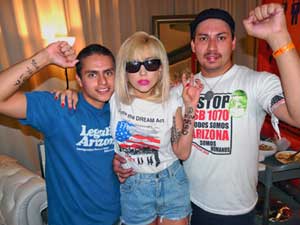LGBTQ migrant workers, Lady Gaga & Arizona boycott
By
Imani Henry
Published Aug 4, 2010 10:53 PM
On July 31, under the pressure of a national campaign calling for her to honor
the boycott of Arizona, Lady Gaga, one the biggest icons in pop music, met with
local activists and used her Phoenix concert to speak out against SB1070.
|
Amelec Jaalam Diaz, Lady gaga and
Victor Medina.
Photo: Victor Medina
|
In the past, Lady Gaga had willingly used her celebrity to promote social
justice causes. Out as bisexual, she has spoken out for lesbian, gay, bi, trans
and queer rights at award shows, as well as donated concert proceeds to the
people of Haiti after the Jan. 12 earthquake. But as publicity grew around the
Rage Against the Machine’s July 21 Los Angeles concert to benefit the
Arizona boycott movement, Lady Gaga, along with bands like Kiss and the Stone
Temple Pilots, were juxtaposed in the coverage as big name acts who
weren’t boycotting Arizona.
Unlike Kiss, a large percentage of Lady Gaga’s fan base is young people
of color, especially from the lesbian, gay, bi and trans communities. The
question became: How could she honor the boycott of a corporation like BP, but
not honor the boycott of the racist, anti-immigrant state of Arizona? Could the
LGBTQ community afford to have an icon of LGBTQ equality hold a sold-out show
in Phoenix, two days after SB1070 was scheduled to go into effect, without
taking a stand against racism? No!
On July 24, an online petition campaign, “From Arizona to Lady Gaga
— Honor the Boycott,” was launched by LGBTQ activists in Phoenix as
part of a July 23-30 week of international solidarity with Arizona. Led by two
gay men, Victor Medina, a Chicano activist with the group Puente Arizona, and
Amelec Jaalam Diaz, a migrant student activist of the Arizona DREAM Act
Coalition, the campaign also featured “Letters to Lady Gaga.” These
very personal and powerful letters described not only the racist impact of
SB1070 but also the added oppression for LGBTQ people who had migrated to the
U.S. from Mexico without documentation. The letters asked her to meet with
LGBTQ migrant community members as part of her trip to Phoenix.
A frenzy of activism began. LGBTQ, immigrant rights and progressive movements
circulated the letters and petition. The media were called, bloggers wrote and
LGBTQ groups like GetEQUAL ran online ads. Several LGBTQ and AIDS groups came
forward to help reach out to Lady Gaga’s management team.
Lady Gaga didn’t cancel her concert, but the message from her fans and
the LGBTQ and progressive movements to honor the boycott had been heard loud
and clear. On July 31, she met with Medina and Diaz, and got a crash course on
migrant rights. She then used her concert as an anti-SB1070 platform, making
her one of the biggest pop stars to date to come out against the racist
law.
The people of Arizona fight back
This tremendous victory with Lady Gaga would not have been possible with only
an online campaign. It was part of a week of solidarity actions in the streets
— from a banner drop from a crane in downtown Phoenix on July 28 to the
marches, rallies and mass civil disobediences on July 29 all over Arizona and
the country. Ultimately, the people in motion, like Medina, Diaz and other
LGBTQ activists from Arizona to New York City, forced Lady Gaga to take a
stand.
In fact, the night before the meet-and-greet with Lady Gaga, Medina, like the
rest of the members of Puente, was at a police station demanding the freedom of
their leader, Salvador Reza, who had been unjustly arrested for simply standing
across the street observing a direct action.
In an interview on Aug. 1, Medina told Workers World, “The sheriff,
Arpaio, is out of control. Before July 29th, there was a raid every week. In
the past three days there have been raids every day.
“Arpaio holds a press conference every day announcing the raids. People
then live in fear of leaving their homes, driving in their cars with a cracked
windshield, or even smoking a cigarette for fear of being pulled
over.”
Medina told Workers World about the plight of LGBTQ people who migrated to the
U.S. for work: “We are dealing with gay men who are day laborers who no
longer can stay in front of Home Depot. Lesbians who used to be able to get
work in construction and trans women can’t even get jobs, all living
under the fear of raids and deportation.”
On Aug. 5, Medina and Diaz will help lead another historic moment — the
creation of the first ever LGBTQ migrant group in Phoenix. Called 3rd Space,
the group will bravely hold a “Know Your Rights” forum. According
to Medina, “We’re not just starting a group. We want to start a
revolution!”
Articles copyright 1995-2012 Workers World.
Verbatim copying and distribution of this entire article is permitted in any medium without royalty provided this notice is preserved.
Workers World, 55 W. 17 St., NY, NY 10011
Email:
[email protected]
Subscribe
[email protected]
Support independent news
DONATE


